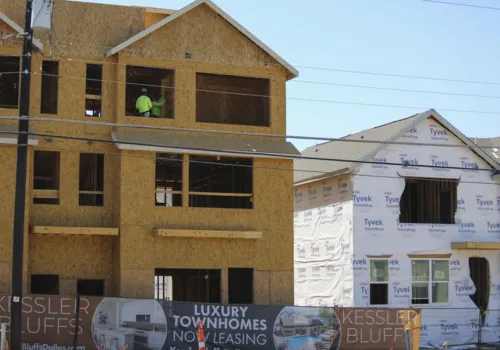
Dallas issued a permit for a three-story duplex townhome in East Dallas, only to later claim the home was too tall. Now, the Texas Supreme Court is tasked with determining whether the completed structure must be torn down or if it can remain in place, despite being found out of compliance with certain city height ordinances.
In 2022, Dallas District Court Judge Eric Moyé ruled in favor of property developer Phillip D. Thompson, granting his company, PDT Holdings, the right to continue construction despite the city’s stop-work order. The city had approved the permit but failed to catch the height discrepancy until the home was mostly built.
However, the Fifth Court of Appeals disagreed, concluding that the city’s mistake wasn’t intentional and that the builders could have ensured compliance earlier.
Thompson’s attorney, Christopher Kratovil, insists that the developers acted in good faith. "We’re talking about tearing it down because it’s marginally too high," Kratovil stated. "That’s absurd. That’s a waste of resources. And it makes the city of Dallas look like a place where no one would want to build and no one would want to do business."
The case will be argued before the Texas Supreme Court on January 15. A spokesperson for the City of Dallas declined to comment due to the pending litigation.
The controversy began in September 2017 when the city approved PDT Holdings' permit for the duplex, designed to reach a maximum height of 36 feet. But soon after, a city inspector determined the home’s parapet wall pushed it over the height limit, though PDT disagreed with the measurement. Construction continued until 2018, when the city issued a stop-work order after a resident filed a complaint about the property exceeding the residential proximity slope (RPS) ordinance, which restricts the height of structures above 26 feet.
Thompson sought an exception from the city’s Board of Adjustment three times, and after the second request was denied, he filed a lawsuit against the city. The duplex, now valued at nearly $1.6 million, cannot be sold or granted a certificate of occupancy until the legal issue is resolved, Kratovil explained.
Moyé’s ruling prevented the city from enforcing the ordinance, but the Fifth Court of Appeals overturned this decision, siding with the city in 2023. The appeals court reasoned that Dallas could only be stopped from enforcing the ordinance in rare situations, and this case didn’t meet that standard.
Kratovil argues that the appeals court improperly reexamined the case without sufficient grounds, as the city never requested findings of fact from Moyé’s ruling. “They didn’t do that,” Kratovil pointed out, emphasizing the city’s failure to present the basis for its appeal.
City attorneys admit their oversight in approving the permit but argue that PDT also failed to conduct proper due diligence. The city urges the Texas Supreme Court to uphold the appeals court's decision and emphasize the importance of governmental authority to enforce laws even in the face of errors.
In court documents, the city defended its decision, stating that while it approved the permit in error, PDT should have flagged the violation earlier. The city also stressed that residents were not at fault for the noncompliant structure.
The case isn’t isolated, as Dallas has faced similar situations in other parts of the city, where permits were granted using outdated zoning information. In 2024, city officials acknowledged errors in the Elm Thicket-Northpark area, where 19 out of 29 projects were found to be out of compliance due to outdated zoning information.
Despite these issues, Kratovil argues that developers shouldn’t be penalized for delays in enforcement. "There’s got to be an endpoint where if the city doesn’t catch it in a reasonable amount of time, they’ve waived the alleged violation," he said. "It’s just a matter of equity, appropriate resource management, common sense, and simple justice."